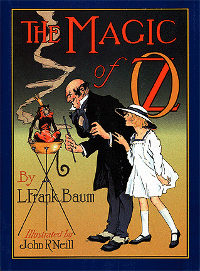So Ozma is having a birthday again. Yawn. And the various adopted citizens and hangers-on at the palace don’t know what to get her. Yawn. And an old enemy of Oz reappears. Yawn. Yawn. Have we reached the end yet?
Magic of Oz, the thirteenth book in Baum’s Oz series, is, above all, a tired book. Very little new happens. Glinda sets a group of young girls to weaving and sewing a gown formed from silk spun from softened emeralds. Trot, Cap’n Bill and the Glass Cat figure an ever changing magical plant will do the trick. Dorothy and the Wizard, cudgeling their brains together, come up with…performing monkeys. It’s even drearier than it sounds.
Ozma’s birthday, indeed, makes for such a weak plot that Baum was forced to add a second, where the former Nome King, still called Ruggedo, attempts to take over Oz with the help of a boy who knows how to do transformations. But although Ruggedo still schemes, his heart isn’t really in it, and a reuse of a plot device from The Emerald City of Oz only shores up the sense of eh. We’ve seen both plots before—and in contrast to the colorful parade of characters and detailed party entertainment descriptions of Road to Oz, this party is summed up in a few terse sentences. Even the monkeys, a supposed integral part of the plot, make only a truncated appearance.
Indeed, the only parts that make this book readable at all are the transformation of the vain and self-centered Glass Cat into an almost heroic and helpful creature (if one with a severe attitude)—and the introduction of the Lonesome Duck, who finds the company of other creatures dull and unendurable. Frankly, in this book, it’s difficult to disagree with her.
Perhaps aware that this is not exactly compelling stuff, Baum tries to add some excitement through nearly shrinking Trot and Cap’n Bill to death. (It almost works as a metaphor for the entire book.) And he gives us a paragraph or two explaining why anyone would even bother to give the Ruler of Oz a birthday party after her nearly continual record of Rulership Fail. As it turns out, she likes to head to kitchens and interrupt hard working cooks at their work; put children’s lives at risk with dangerous rides on the Sawhorse; and ask humble charcoal burners what else they might need to make them happy. (Apparently “a new job” and “rooms at the palace” aren’t the answers she’s looking for.) But coming at the end of the book, as it does, this does not exactly provide extensive character motivation or a good reason for anyone to risk his or her lives for a birthday gift.
With most authors, a book of this sort would be a clear sign to give up and move on. But Baum had one more Oz book left in him.
Mari Ness thinks that a gown woven of emeralds would get very itchy. She lives in central Florida.










